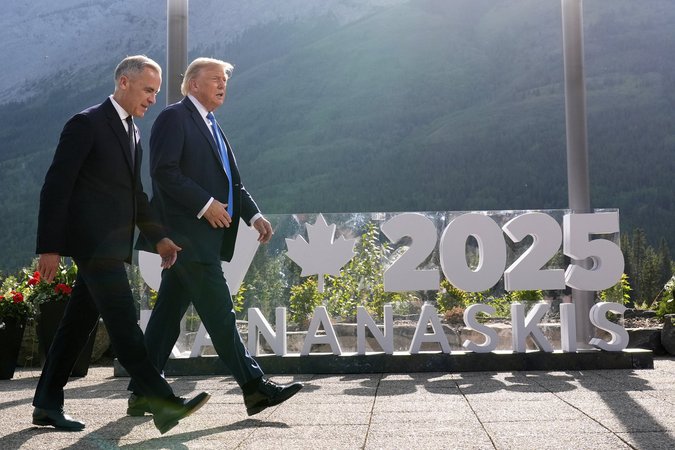Politics
Indigenous Businesses Halt U.S. Exports Due to New Tariff Policies

Several small Indigenous businesses in Canada are suspending exports to the United States following the implementation of new tariffs. This decision comes despite longstanding trade relationships that predate the formation of both countries. The changes, initiated under the administration of former President Donald Trump, have prompted concerns over the viability of Indigenous trade routes and existing treaties.
Impact of New Tariff Regulations
According to Matthew Foss, vice president of research and public policy at the Canadian Council for Indigenous Businesses, the new regulations necessitate urgent attention to resolve trade barriers for Indigenous Peoples. “There needs to be a resolution to allow Indigenous Peoples to continue to undergo the trade routes that they have established and practised,” Foss emphasized. He noted that treaties signed in the past should be respected and upheld by both the Canadian and U.S. federal governments.
In July 2025, President Trump announced a suspension of duty-free de minimis imports from all countries. This policy, which came into effect on August 27, 2025, alters the previous allowance where goods valued under $800 could enter the U.S. without customs clearance. Under the new guidelines, these shipments will now be subject to tariffs ranging from 10 to 50 percent.
The changes represent a significant financial burden for small businesses. For the next six months, carriers will have the option to impose a flat duty of $80 to $200 per package, replacing the former value-based rate. This has raised alarms among Indigenous artisans, who often lack the resources to navigate complex regulatory requirements.
Voices from Indigenous Entrepreneurs
Among those affected is Stevi Riley, a resident of Walpole Island First Nation and owner of The Beaded Hero. She stated that nearly half of her business’s orders come from the U.S. The new import rules led her to cease all sales to the American market, a decision she finds discouraging. “I just felt discouraged,” Riley shared, expressing concerns about a potential 35 percent increase in shipping costs and the risk of her products being returned or destroyed.
Other businesses have echoed similar sentiments. Tribal Spirit Drums and Music, based in Ivry-sur-le-Lac, Quebec, announced their decision to halt U.S. sales via social media, citing the new de minimis regulations. Dominique O’Bonsawin, who operates Cedarlilie Beads, lamented the lost opportunities for growth in the U.S. market, stating, “Not being able to trade freely creates more distance and barriers for rebuilding relationships with communities in the U.S.”
The Trump administration defended the new tariffs by claiming that the previous de minimis exemption was exploited by foreign businesses to bypass tariffs, contributing to the illicit entry of drugs and counterfeit goods into the U.S. This shift in policy has raised uncertainties regarding the future of U.S.-Canada trade relations, particularly for Indigenous businesses.
Jack Royal, chairman and CEO of the Indigenous Businesses Corporation, highlighted the instability these changes have caused. “Like other small businesses, what First Nations are looking for is some certainty and to look for support on how we can maximize our other options,” he said.
As of now, Canada Post has not suspended exports to the U.S. but is working to assess the situation and provide solutions for affected businesses. The Universal Postal Union reported that twenty-five countries have already suspended postal services to the U.S. as they await further clarification on how these measures will be implemented.
Advocacy and Future Prospects
In response to the evolving situation, the Canadian Council for Indigenous Businesses has been actively engaging with the Canada Trade Commissioner Service to find solutions for cross-border trade challenges. Meanwhile, the Assembly of First Nations is set to debate a series of resolutions at their annual general meeting in Winnipeg, including a proposal by Chief Roger Redman of Standing Buffalo First Nation to seek funding for a legal opinion on Aboriginal and treaty rights to cross-border trade.
O’Bonsawin remains hopeful for a return to normalcy in trade relations. “I don’t see anything being done in the near future unfortunately, but I’m hopeful the next U.S. administration will do better for Canada and the U.S.,” she stated, reflecting the sentiments of many Indigenous entrepreneurs who are eager to navigate the complexities of international trade.
This report highlights the challenges faced by Indigenous businesses as they adapt to shifting trade policies and seeks to emphasize the need for continued advocacy and support in maintaining their economic connections.
-

 Politics4 weeks ago
Politics4 weeks agoSecwepemc First Nation Seeks Aboriginal Title Over Kamloops Area
-

 World5 months ago
World5 months agoScientists Unearth Ancient Antarctic Ice to Unlock Climate Secrets
-

 Entertainment5 months ago
Entertainment5 months agoTrump and McCormick to Announce $70 Billion Energy Investments
-

 Science5 months ago
Science5 months agoFour Astronauts Return to Earth After International Space Station Mission
-

 Lifestyle5 months ago
Lifestyle5 months agoTransLink Launches Food Truck Program to Boost Revenue in Vancouver
-

 Technology3 months ago
Technology3 months agoApple Notes Enhances Functionality with Markdown Support in macOS 26
-

 Lifestyle3 months ago
Lifestyle3 months agoManitoba’s Burger Champion Shines Again Amid Dining Innovations
-

 Top Stories2 months ago
Top Stories2 months agoUrgent Update: Fatal Crash on Highway 99 Claims Life of Pitt Meadows Man
-

 Politics4 months ago
Politics4 months agoUkrainian Tennis Star Elina Svitolina Faces Death Threats Online
-

 Sports5 months ago
Sports5 months agoSearch Underway for Missing Hunter Amid Hokkaido Bear Emergency
-

 Politics5 months ago
Politics5 months agoCarney Engages First Nations Leaders at Development Law Summit
-

 Technology5 months ago
Technology5 months agoFrosthaven Launches Early Access on July 31, 2025





















